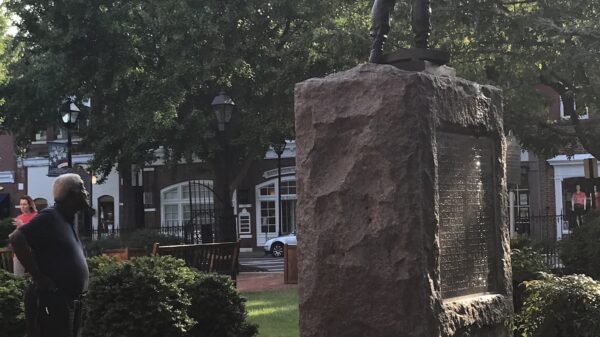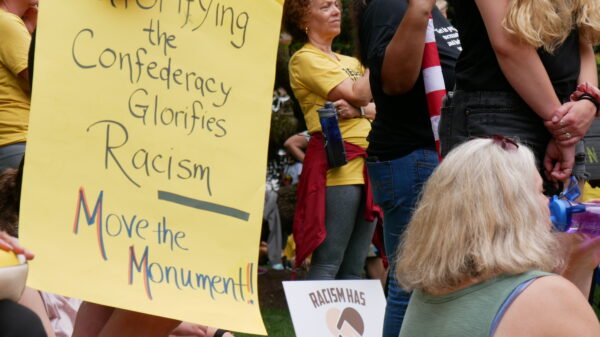Contact: Meredith Curtis, media@aclu-md.org, 443-310-9946
EASTON, MD - Challenging a Talbot County Council decision made behind closed doors to retain a Confederate monument on the County Courthouse lawn, the American Civil Liberties Union (ACLU) of Maryland and the Talbot County Branch of the NAACP (NAACP) today filed a Complaint with the Open Meetings Compliance Board, asking the Board to rule that the County's actions violated the Maryland Open Meetings Act.
The "Talbot Boys" monument, erected in 1916, celebrates soldiers from Talbot County who fought for the Confederacy against the United States during the Civil War. Although many more Talbot men fought for the Union, Talbot County leaders refused to memorialize Union soldiers from the community, electing instead to honor only those who died for the Confederacy. The statue depicts a Rebel soldier with a Confederate battle flag draped across his back, and bears the caption "To the Talbot Boys, 1861-1865, C.S.A."
Many African Americans consider the statue an affront to their humanity - a symbol of racism and injustice at the one place in the community meant to be dedicated to serving justice for all, the County Courthouse. On this basis, the Talbot NAACP last July asked the County to consider moving the statue to an alternative location dedicated to historic preservation rather than justice.
While the process undertaken by the County began in an open fashion, with the Council meeting the NAACP to hear its proposal and inviting community residents to attend public forums to air their opinions, "it shifted dramatically when it came the Council's turn to debate and vote upon removal or retention of the Talbot Boys statue," the Complaint alleges. "When Council members themselves were called upon to discuss the matter and vote, they flouted all principles of openness, deciding in secret to retain the monument, and subsequently providing no minutes of these closed discussions."
"We understand that government officials might prefer to dodge public discussion of our country's history of slavery, racial injustice, and their continuing legacy," said ACLU Legal Director Deborah Jeon. "But the law does not allow that. At the heart of our democratic tradition is the right of citizens to know how their elected officials make decisions that affect them, especially in a case like this where critical racial justice issues are at stake."
Questioned about the process they followed in reaching decision to retain the monument, County officials have given conflicting explanations for deciding the matter in secret. First, County Council President Corey Pack claimed the Council was entitled to discuss the NAACP request for removal of the statue in private because it is a "real estate matter." But in fact, the real estate exception to the Open Meeting Act pertains only to discussions about real estate acquisitions, not to property the County already owns. An alternative explanation offered most recently by the County Attorney is that the NAACP request raises only a "routine administrative matter," insufficiently important to be debated by the Council in public.
"That's offensive," said Talbot NAACP President Richard Potter. "The government's continued endorsement of a monument to slavery at the County Courthouse - of all places -- is an issue of extraordinary significance to African Americans, here and throughout Maryland. For the County to just dismiss our concerns, saying they are not even important enough for the Council to discuss and vote upon in public, tells us all we need to know about the enduring effects of Jim Crow in Talbot County."
###
Related Content

Activists Challenge Talbot County’s Unconstitutional Million-Dollar Insurance Requirement on Juneteenth Rally Against Confederate Monument
Stay Informed
Sign up to be the first to hear about how to take action.
By completing this form, I agree to receive occasional emails per the terms of the ACLU’s privacy statement.
By completing this form, I agree to receive occasional emails per the terms of the ACLU’s privacy statement.

